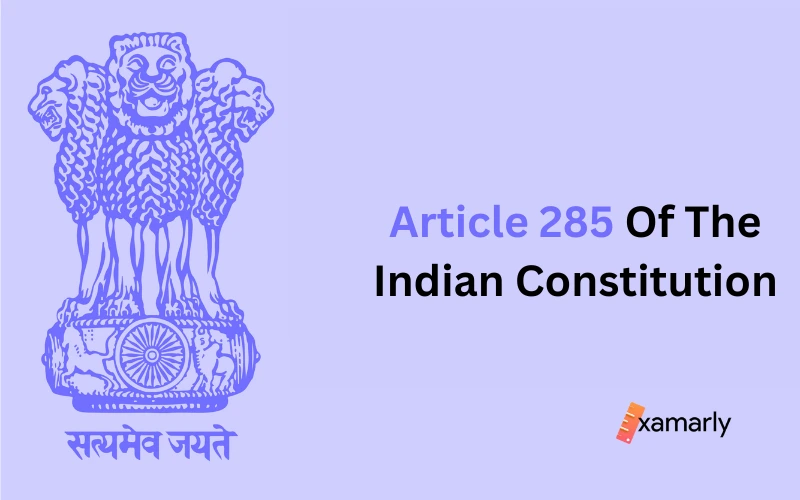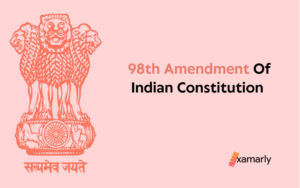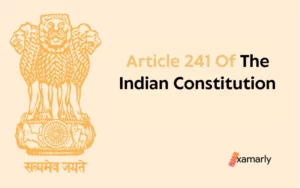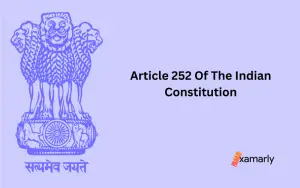An Overview
A tax is a compulsory fee or a monetary charge that is imposed on a person or an organisation. This is imposed by any government in order to collect income for the purpose of funding public works that provide the most advanced services and infrastructure. After that, the money is used toward funding various initiatives that are supported by public expenditures.
Article 285 of the Indian Constitution revolves around the tax relief for properties owned by the Union that are subject to taxation of the State.
In this detailed blog about Article 285 we will explore its contents, try to analyse its clauses in terms of the provision it provides and also take a brief look at its background. Through this blog we will also address some of the frequently asked questions that are related to Article 285.
Let’s gain an in-depth understanding of Article 285 of the Indian Constitution and get a clear concept of the article through this blog.
- An Overview
- Background Of Article 285 Of The Indian Constitution
- What Does Article 285 Of The Indian Constitution Deal With?
- Clause (1) Of Article 285 Of The Indian Constitution: Explained
- Clause (2) Of Article 285 Of The Indian Constitution: Explained
- Summing Up
- FAQs Related To Article 285 Of The Indian Constitution
- What Does It Mean For A Property To Be Exempt From The Taxation Of A State?
- What Is The Purpose Of Exempting A Property From The State Taxation Under Article 285 Of The Indian Constitution?
- Who Decides Which Property Is Exempt From State Taxation Under Article 285 Of The Indian Constitution?
- How Many Clauses Are There In Article 285 Of The Indian Constitution?
- Which Chapter Of The Constitution Of India Does Article 285 Of The Indian Constitution Fall Under?
Background Of Article 285 Of The Indian Constitution
- Draft Article 264 was introduced for the purpose of shaping Article 285 Of The Indian Constitution. It was debated on September 9, 1949.
- An amendment was proposed by a member. According to his suggestion, the property of the Union shall be subject to all of the taxes levied by any local government inside a state, on any property that a person could own.
- He reasoned out that the local authorities provide services to the properties. The properties should not be excused from paying taxes since the local authorities do provide those services to them.
- A small number of members voted in favour of this amendment.
- In response to the suggested modification, the Chairman of the Drafting Committee voiced out his opinion. He noted that no property belonging to a person whose interests are not represented in any specific organisation should be subject to taxation by that organisation.
- In addition to this, he contended that the State Legislature is where a local entity obtains its jurisdiction to levy taxes. If this were true, then the Union would never be aware of the tax that a local body is authorised to collect, as well as the type of the tax or its range.
- He said that the purpose of the Draft Article was not to free Parliament from being entirely accountable to taxes. Instead, the purpose of the Draft Article was to enable Parliament to evaluate the taxing power of the local government. This was his interpretation of what the Draft Article was trying to accomplish.
What Does Article 285 Of The Indian Constitution Deal With?
Article 285 of the Indian Constitution deals with the exclusion of the property that is in possession of the Union government from paying taxes to a State.
The provisions contained in this article of the Indian Constitution are divided into two clauses, namely- clause (1) and clause (2). We will now take a look at both these clauses individually and try to determine its meaning. These clauses have been directly quoted from the official text of the Constitution of India.
Clause (1) Of Article 285 Of The Indian Constitution: Explained
(1) The property of the Union shall, save in so far as Parliament may by law otherwise provide, be exempt from all taxes imposed by a State or by any authority within a State.
The first clause of this article mentions the property of the Union, which refers to the property under the possession of the Union government of India. The clause states that the property of the Union shall not have the need to pay any taxes imposed by a State or by any authority that is present within a State. The only exception to this clause is the implementation of a law coming due to Parliamentary legislation.
In other words, this clause establishes that the property of the Union government is generally not subject to taxes imposed by the government of a State or by any other governmental body within a State.
The clause informs us that Parliament may pass a law to provide otherwise, meaning that Parliament has the authority to modify or override the exemption from State taxes for the property of the Union. However, unless such a law is passed, the property of the Union is generally exempt from the taxation of a State.
Clause (2) Of Article 285 Of The Indian Constitution: Explained
(2) Nothing in clause (1) shall, until Parliament by law otherwise provides, prevent any authority within a State from levying any tax on any property of the Union to which such property was immediately before the commencement of this Constitution liable or treated as liable, so long as that tax continues to be levied in that State.
Clause (2) of this article makes a reference to the previous clause, which states that the property of the Union government shall be exempt from all taxes imposed by a State or by any authority within a State.
However, the second clause allows for a temporary exception to this exemption. It states that any authority within a State may continue to levy taxes on the property of the Union government if that property in question was liable or treated as liable for such taxes immediately before the commencement of the Constitution, that is, the date on which the Constitution came into effect.
In other words, this clause allows for the continuation of certain taxes that were already in place before the Constitution was enacted. The provision provided under this clause of Article 285 is applicable even if those taxes would normally be prohibited by clause (1) that is, the general exemption from State taxes for the property of the Union.
However, the clause specifies that this exception only applies so long as the tax in question continues to be levied within the premises of the State. Once the tax is no longer levied, the general exemption from State taxes for the property of the Union government would apply.
You Might Also Like:
| Article 284 of the Indian Constitution | Article 283 of the Indian Constitution |
| Article 282 of the Indian Constitution | Article 281 of the Indian Constitution |
Summing Up
After a thorough reading of the article, we can come to the following conclusions. They have been listed below.
- Article 285 of the Indian Constitution deals with the State tax exemption of property owned by the Union government.
- In the first clause of the article, it is stated that the property of the Union government should be free from any taxes that are imposed by a State or by any authority that is located inside a State. This provision is applicable unless an alternative provision is made by a legislation that is enacted by Parliament.
- The second clause allows for a temporary exception to this exemption. It allows any authority within a State to continue levying taxes on the property of the Union government if that property was liable or treated as liable for such taxes immediately before the commencement of the Constitution.
- This exception only applies as long as the tax is still being levied within the State. Once the tax is no longer levied, the general exemption from State taxes for the property of the Union applies.
FAQs Related To Article 285 Of The Indian Constitution
What Does It Mean For A Property To Be Exempt From The Taxation Of A State?
When a property is exempt from the taxation of a State, it means that it is not subject to tax by the State government. This means that the owner of the property does not have to pay any taxes on it to the State.
What Is The Purpose Of Exempting A Property From The State Taxation Under Article 285 Of The Indian Constitution?
The purpose of exempting a property from the State taxation is to prevent the State government from taxing certain types of property that are deemed to be of public importance or that serve a public function. This is typically done to ensure that the property can be used for its intended purpose without being hindered by the burden of taxation.
Who Decides Which Property Is Exempt From State Taxation Under Article 285 Of The Indian Constitution?
Under Article 285 of the Indian Constitution, the decision as to which property is exempt from the taxation of a State is typically made by Parliament.
Parliament has the authority to pass laws that specify which types of property are exempt from taxation, and under what circumstances.
How Many Clauses Are There In Article 285 Of The Indian Constitution?
Article 285 of the Indian Constitution is composed of two clauses, namely- clause (1) and clause (2).
Which Chapter Of The Constitution Of India Does Article 285 Of The Indian Constitution Fall Under?
Article 285 of the Indian Constitution is included in Chapter XII. This chapter deals with Finance, Property, Contracts, and Suites. Further, it falls under Chapter I which is titled ‘Finance’. Under this chapter, the article is listed under the category of Miscellaneous Financial Provisions.






